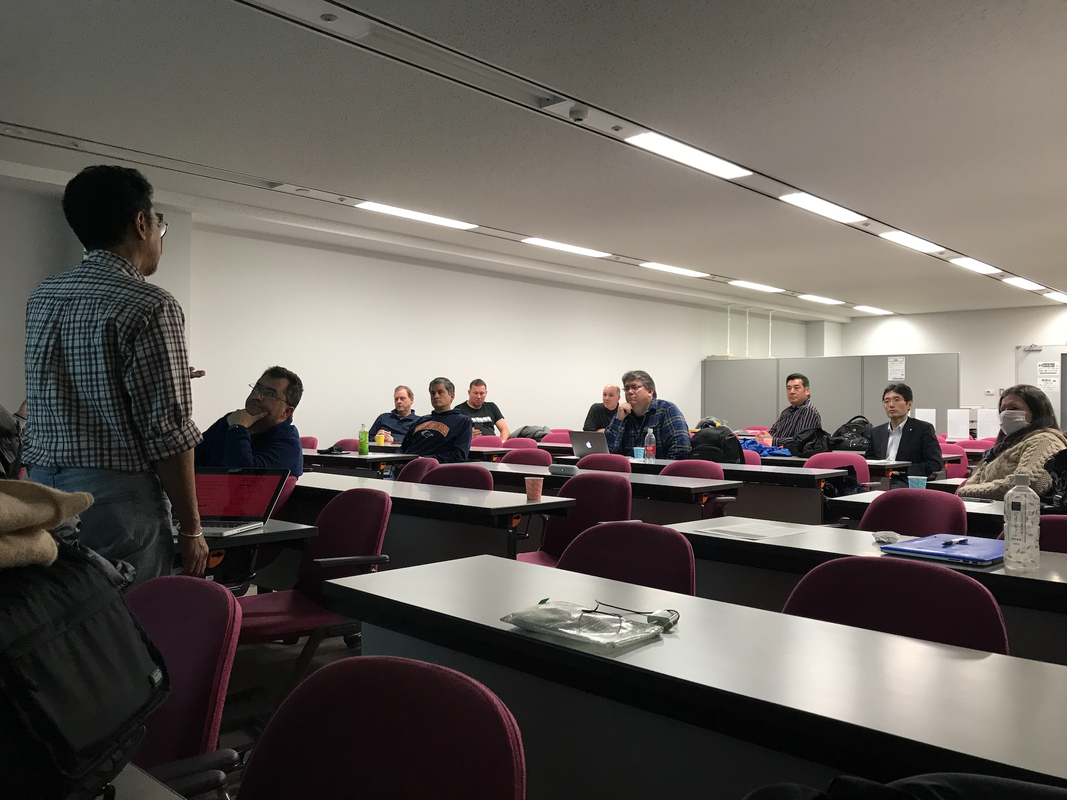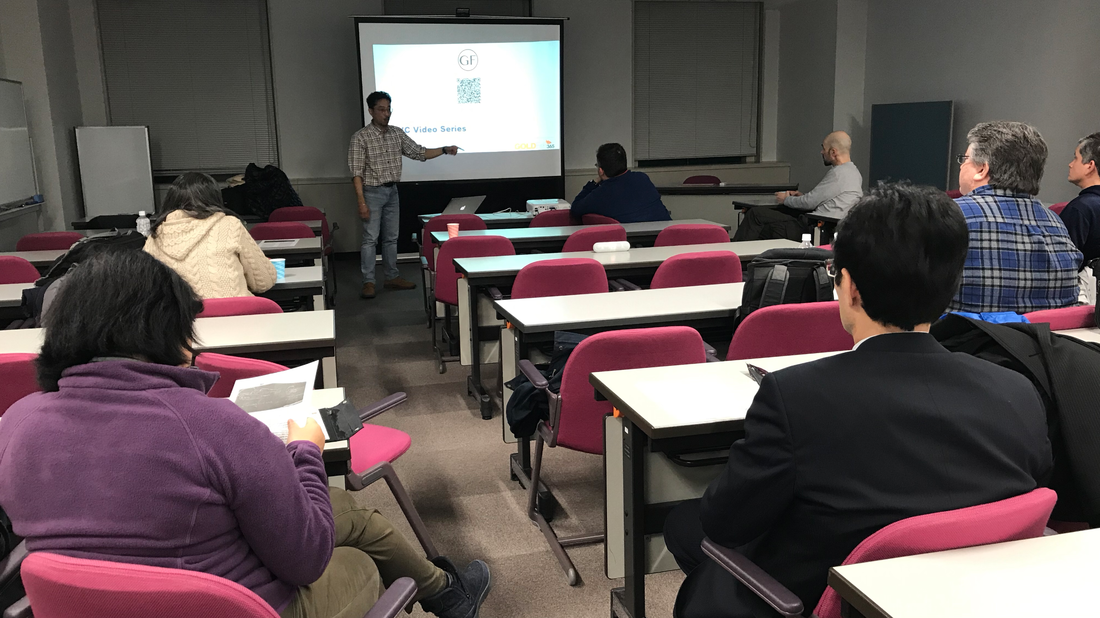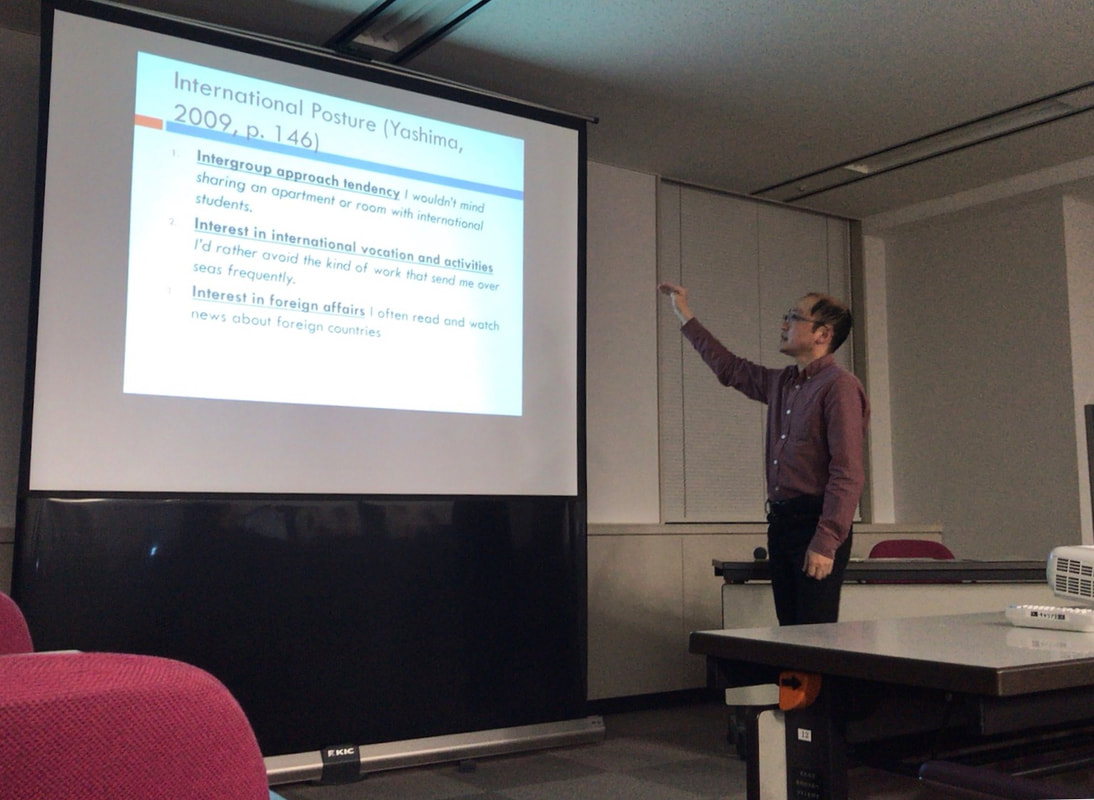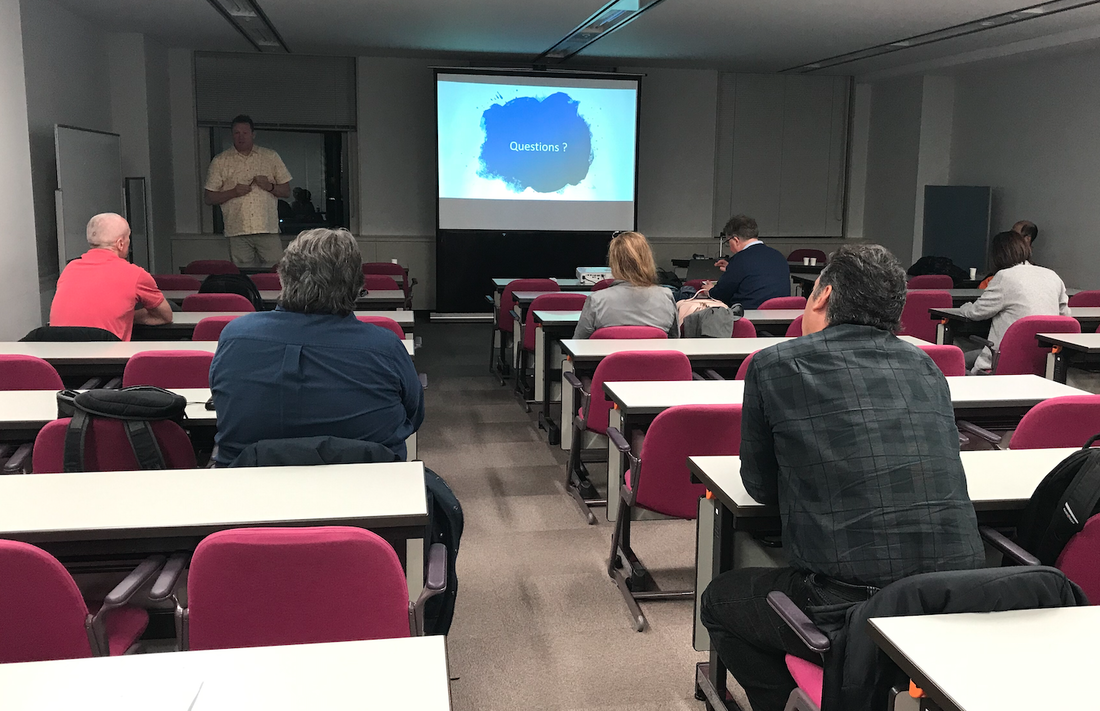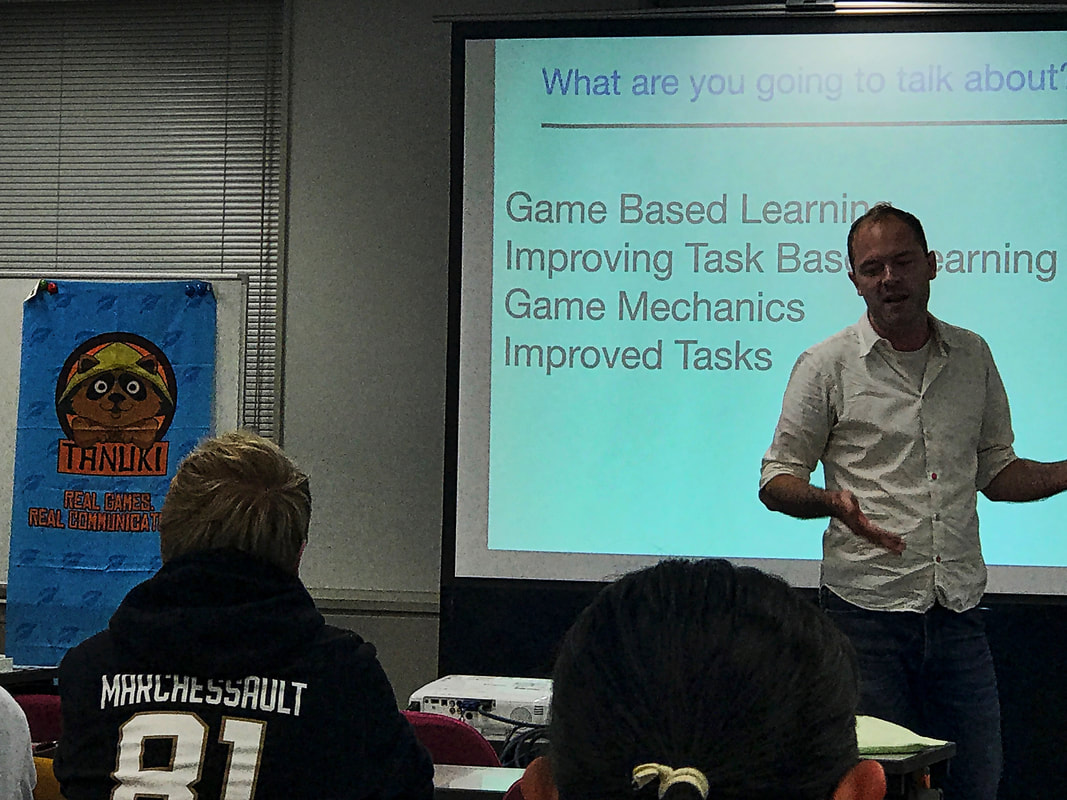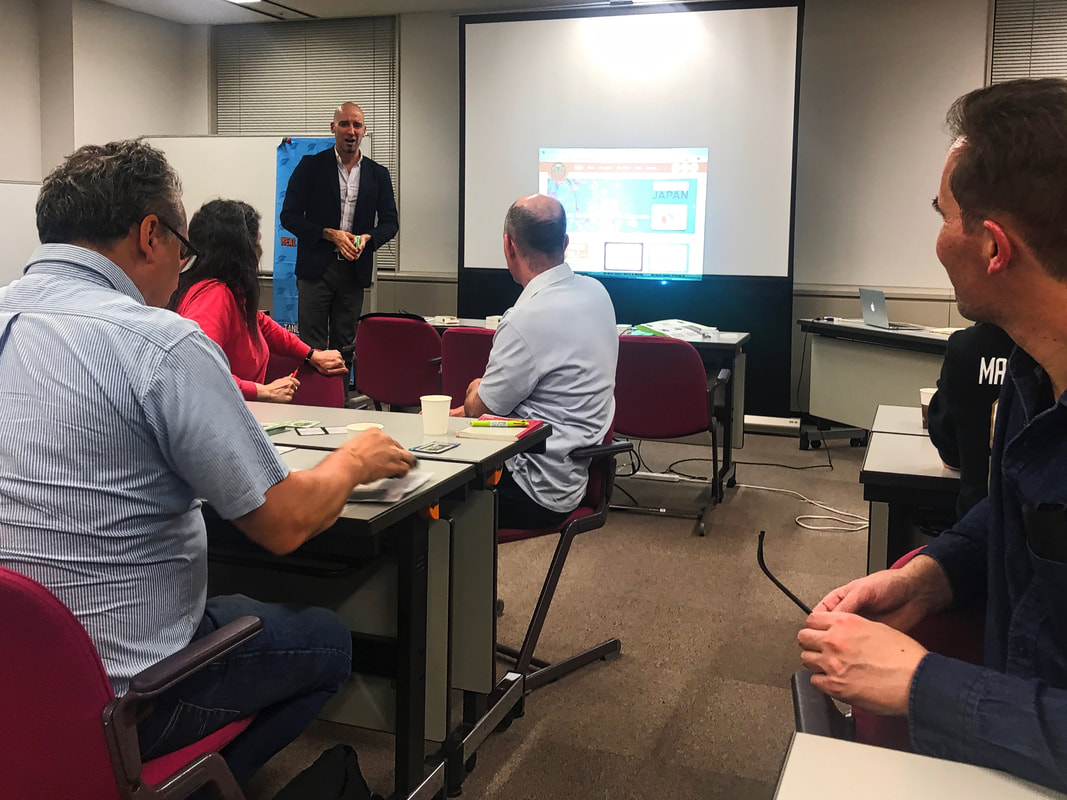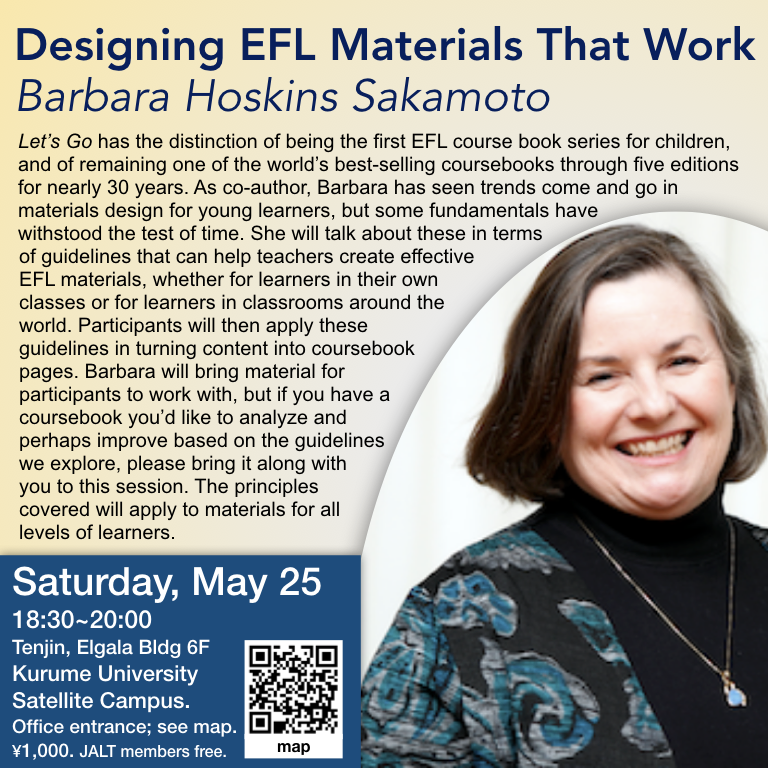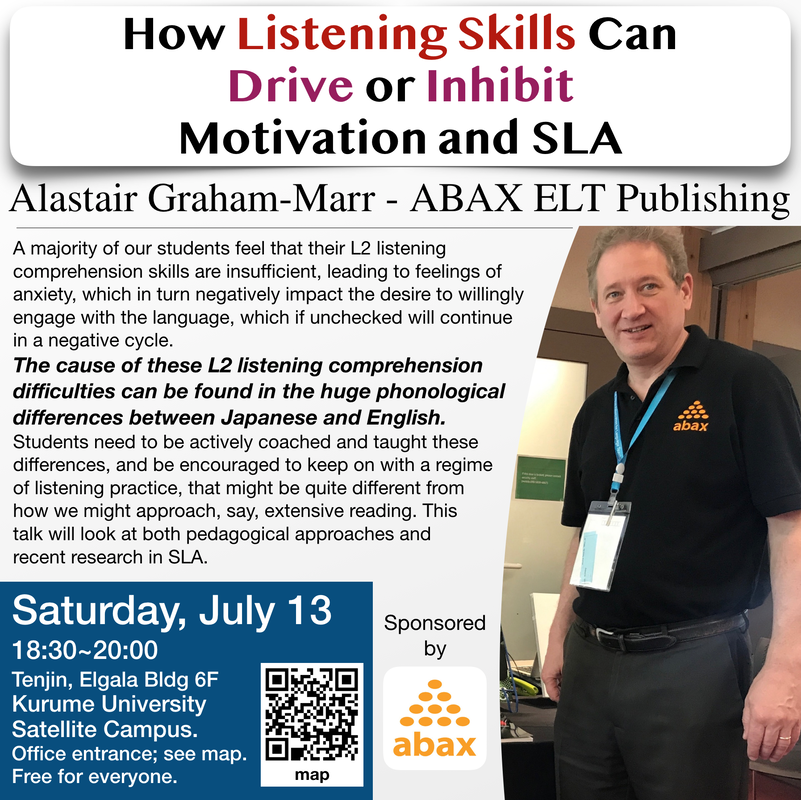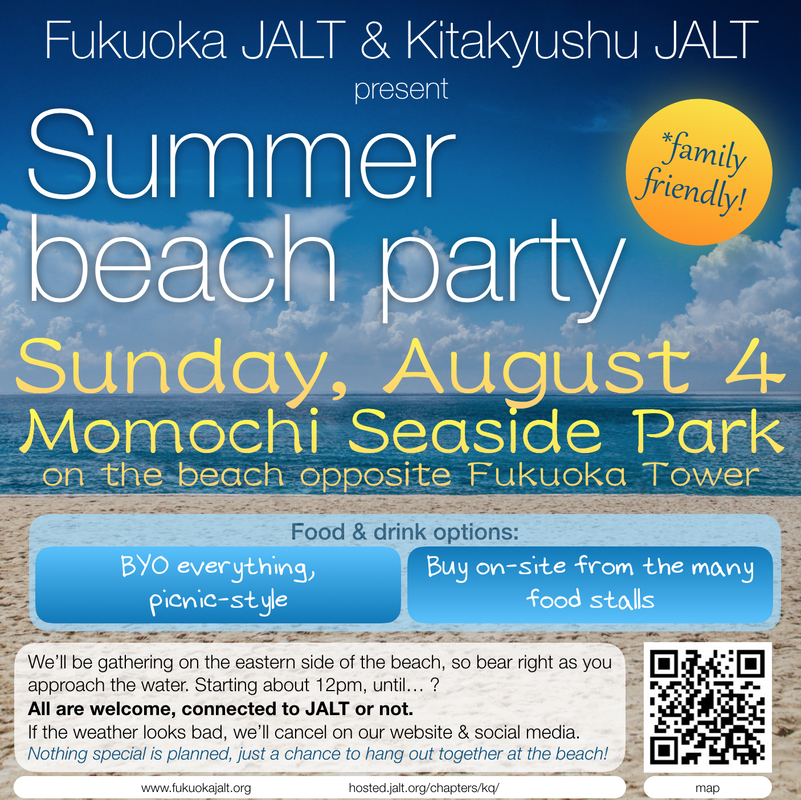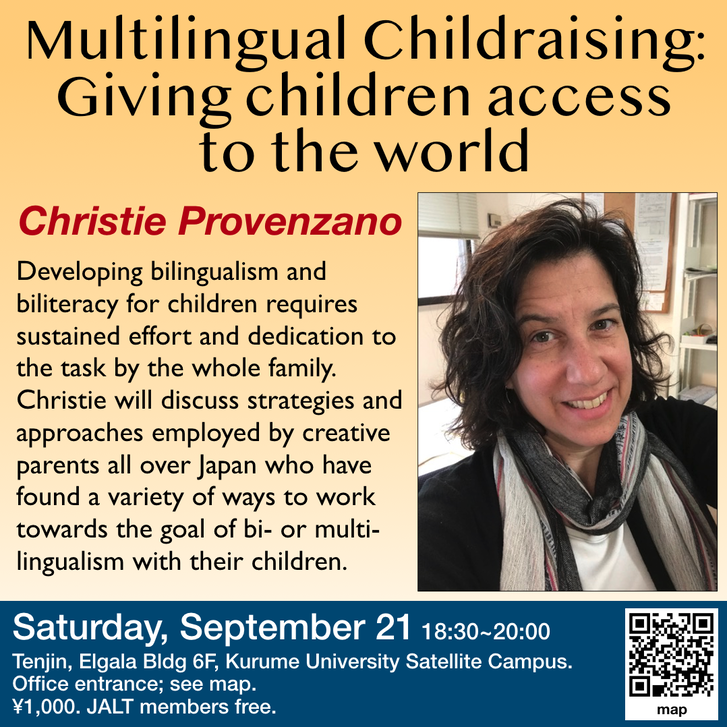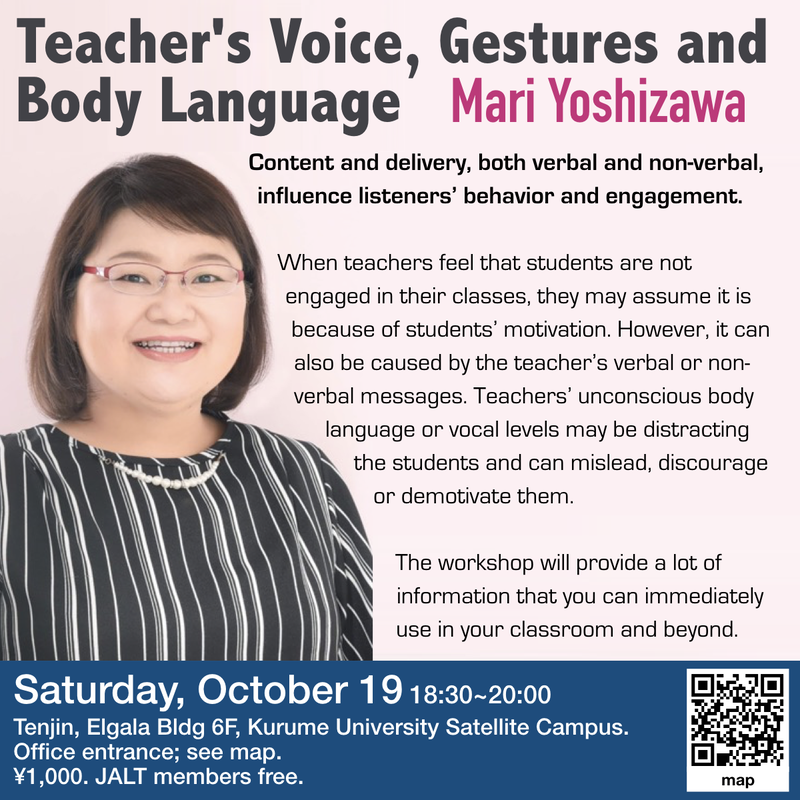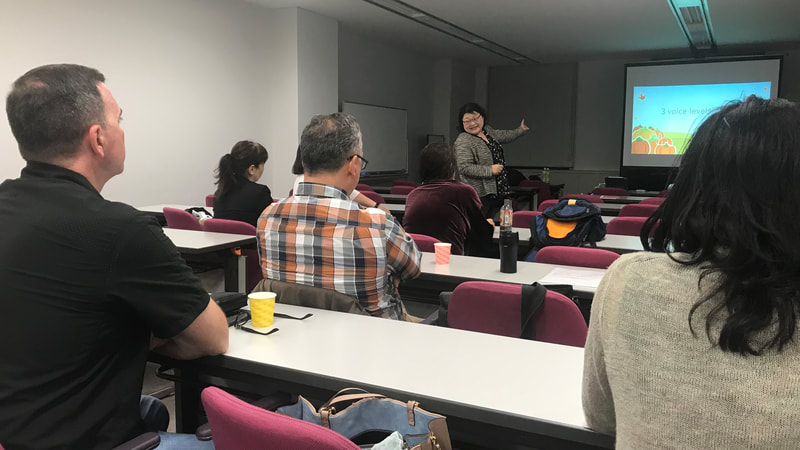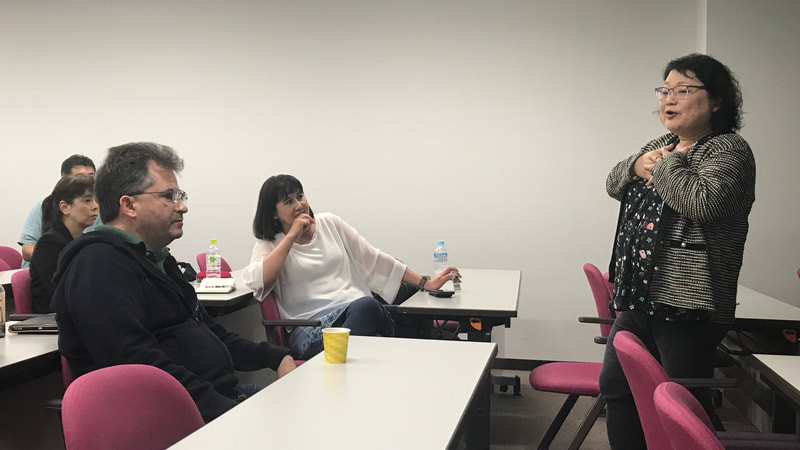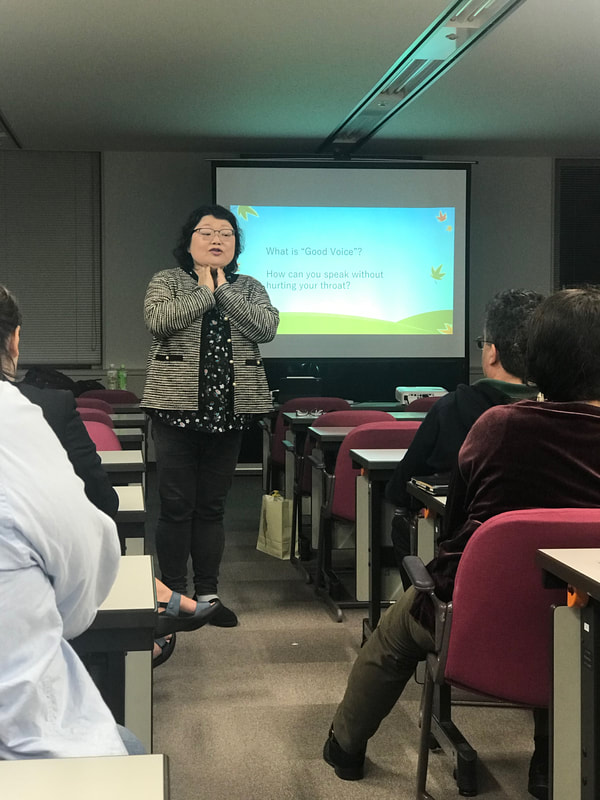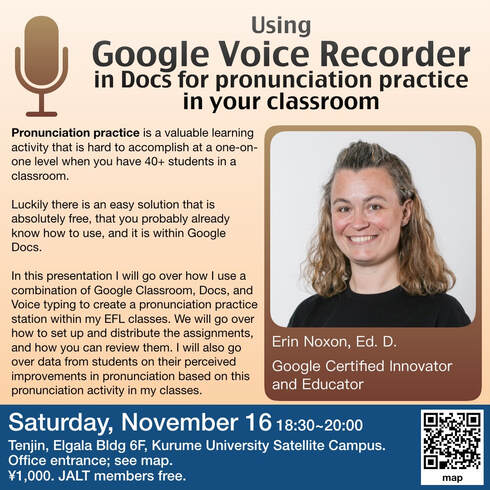This is Fukuoka JALT's archive of past events in 2019. For upcoming events, please see our front page.
January 12, 2019
Inside a Fluency-Focused English Classroom
José Domingo Cruz
19:00 - 21:00
Tenjin: Kurume University Satellite Campus in the ELGALA building, next to Daimaru, near Tenjin Minami station. Use the south-east "Office" entrance. (See our locations page for a map image)
All teachers want their students to achieve higher levels of fluency, but how to teach it, and which classrooms methods actually work? The presenter has been teaching fluency-based speaking classes for over 20 years, and will share his methods and theories to get students to speak faster and to say more. In addition to a basic description of the essentials of his teaching techniques, he will demonstrate some basic classroom activities for fluency, such as basic “Speed Conjugation”, another called “One Idea, One Breath” (OIOB) which is aimed at fluency improvement, and perhaps also, “Disagreements”. Time permitting, there will also be an introduction to his Authentic Listening / fluency practice website, GOLDFish365 - http://goldfish365.com/.
Inside a Fluency-Focused English Classroom
José Domingo Cruz
19:00 - 21:00
Tenjin: Kurume University Satellite Campus in the ELGALA building, next to Daimaru, near Tenjin Minami station. Use the south-east "Office" entrance. (See our locations page for a map image)
All teachers want their students to achieve higher levels of fluency, but how to teach it, and which classrooms methods actually work? The presenter has been teaching fluency-based speaking classes for over 20 years, and will share his methods and theories to get students to speak faster and to say more. In addition to a basic description of the essentials of his teaching techniques, he will demonstrate some basic classroom activities for fluency, such as basic “Speed Conjugation”, another called “One Idea, One Breath” (OIOB) which is aimed at fluency improvement, and perhaps also, “Disagreements”. Time permitting, there will also be an introduction to his Authentic Listening / fluency practice website, GOLDFish365 - http://goldfish365.com/.
February 23, 2019
MyShare: Technology for Increasing Participation and Streamlining Your Workflows
Various speakers: Neil McClelland (University of Kitakyushu), Bill Pellowe (Kindai University, Iizuka Campus), Robert Chartrand (Kurume University), Steve Paton (Fukuoka University)
18:00 - 21:00
Tenjin: Kurume University Satellite Campus in the ELGALA building, next to Daimaru, near Tenjin Minami station. Use the south-east "Office" entrance. (See our locations page for a map image)
This will be a my-share demonstration event about using freely-available participation / quiz tools such as Kahoot!, Google Quiz, Zipgrade, etc.
Come along and be introduced to some apps that you might decide to use this coming year!
Neil McClelland (University of Kitakyushu)
Flashcards Deluxe: Memorizing students' names
Flashcards Deluxe is not free -- at 500 yen, it's right up there with a coffee from Starbucks. But with great functionality including integration with Excel and Dropbox (iOS also available) and five-sided flashcards that carry photos, this is the ideal tool for quickly memorizing names and faces with large groups of students. The presentation will show how a set of photos and names can be easily put onto a smartphone -- and then used with a choice of options including paced-learning and randomized viewing.
Bill Pellowe (Kindai University, Iizuka Campus)
Kahoot: Active participation in your classes
Kahoot is a free, game-based online learning platform that is easily integrated into our classes. Teachers control the timing of when questions are posed to the students. In this demonstration, participants will learn how to create Kahoot activities and access the results. We will address student privacy issues and accountability so that we can assess individual students' progress and participation while maintaining their privacy.
Robert Chartrand (Kurume University)
ClassMarker: An easy and secure online quiz maker
I had been looking for an online solution for making quizzes online that would be easy to use, secure for my classes and have the ability to incorporate audio and videos into the actual quizzes. I started using ClassMarker because it was easy to use and share with other teachers in my school. The web-based testing tool allows the user to create online assessments with settings such as time limits, randomizing questions, instant feedback, multiple choice, matching, short answer, video, audio, and essays. Students can take the quizzes on their computers, tablets or smartphones. One of the most useful features has been the ability to set time limits, as well as start time and finishing times, so that I can pre-set the test to correspond with my classes. Free accounts provide a functional testing environment for up to 100 test results per month. Paid accounts offer more functionality and larger numbers of test results. I will demonstrate how to setup an account, make a quiz, display the answers and so on in this hands-on workshop.
Steve Paton (Fukuoka University)
ZipGrade: A mobile app for scanning multiple-choice test sheets
ZipGrade is an application that uses your device's camera to scan and grade multiple-choice answer sheets with incredible speed and accuracy. In fact, students can take a 100-question test, and receive their scores before they even leave the classroom. In this demonstration, we will gather data in a short, fun multiple-choice quiz, then answer sheets will be marked and graded instantly on-screen so everyone can see how easy and fast it is. We'll then examine the statistics, score distribution, and item analysis, and then export the data into a spreadsheet; all within 45 minutes, easily! ZipGrade is a magical tool for teachers and researchers.
MyShare: Technology for Increasing Participation and Streamlining Your Workflows
Various speakers: Neil McClelland (University of Kitakyushu), Bill Pellowe (Kindai University, Iizuka Campus), Robert Chartrand (Kurume University), Steve Paton (Fukuoka University)
18:00 - 21:00
Tenjin: Kurume University Satellite Campus in the ELGALA building, next to Daimaru, near Tenjin Minami station. Use the south-east "Office" entrance. (See our locations page for a map image)
This will be a my-share demonstration event about using freely-available participation / quiz tools such as Kahoot!, Google Quiz, Zipgrade, etc.
Come along and be introduced to some apps that you might decide to use this coming year!
Neil McClelland (University of Kitakyushu)
Flashcards Deluxe: Memorizing students' names
Flashcards Deluxe is not free -- at 500 yen, it's right up there with a coffee from Starbucks. But with great functionality including integration with Excel and Dropbox (iOS also available) and five-sided flashcards that carry photos, this is the ideal tool for quickly memorizing names and faces with large groups of students. The presentation will show how a set of photos and names can be easily put onto a smartphone -- and then used with a choice of options including paced-learning and randomized viewing.
Bill Pellowe (Kindai University, Iizuka Campus)
Kahoot: Active participation in your classes
Kahoot is a free, game-based online learning platform that is easily integrated into our classes. Teachers control the timing of when questions are posed to the students. In this demonstration, participants will learn how to create Kahoot activities and access the results. We will address student privacy issues and accountability so that we can assess individual students' progress and participation while maintaining their privacy.
Robert Chartrand (Kurume University)
ClassMarker: An easy and secure online quiz maker
I had been looking for an online solution for making quizzes online that would be easy to use, secure for my classes and have the ability to incorporate audio and videos into the actual quizzes. I started using ClassMarker because it was easy to use and share with other teachers in my school. The web-based testing tool allows the user to create online assessments with settings such as time limits, randomizing questions, instant feedback, multiple choice, matching, short answer, video, audio, and essays. Students can take the quizzes on their computers, tablets or smartphones. One of the most useful features has been the ability to set time limits, as well as start time and finishing times, so that I can pre-set the test to correspond with my classes. Free accounts provide a functional testing environment for up to 100 test results per month. Paid accounts offer more functionality and larger numbers of test results. I will demonstrate how to setup an account, make a quiz, display the answers and so on in this hands-on workshop.
Steve Paton (Fukuoka University)
ZipGrade: A mobile app for scanning multiple-choice test sheets
ZipGrade is an application that uses your device's camera to scan and grade multiple-choice answer sheets with incredible speed and accuracy. In fact, students can take a 100-question test, and receive their scores before they even leave the classroom. In this demonstration, we will gather data in a short, fun multiple-choice quiz, then answer sheets will be marked and graded instantly on-screen so everyone can see how easy and fast it is. We'll then examine the statistics, score distribution, and item analysis, and then export the data into a spreadsheet; all within 45 minutes, easily! ZipGrade is a magical tool for teachers and researchers.
March 23, 2019
Two presentations on learners' stories
Keita Kikuchi and Neil McClelland
6:30pm start
Venue: Tenjin: Kurume University Satellite Campus in the ELGALA building, next to Daimaru, near Tenjin Minami station. Use the south-east "Office" entrance. (See our locations page for a map image)
Cost: 1000yen for non-members. JALT members free.
Hang out after the meeting!
Our after-meeting hangouts are informal and not official Fukuoka JALT events, but are just a good chance to hang out with and get to know other teachers over a meal or a drink. We don’t organize any set menus, there are no RSVPs, just whoever wants to come along can do so and order whatever they like. We’ll choose a place each time that allows everyone to order what they want.
Anyone is welcome, even if you don’t come to the meeting. Just turn up at the restaurant/bar.
It isn't set in stone, but we're thinking of going to Kebab Bar Ampoules this time.
Presentation 1: Keita Kikuchi
Listen to Learners’ Stories: Focusing on Changes of Ideal Self, Ought-to Self, and L2 Learning Experience
As noted by Dörnyei and Ryan (2015), much of the focus of recent motivation research is on the dynamic nature of motivation. However, while there are a handful of studies investigating large groups of learners, there have only been a few studies which tackle the complexity of language learning motivation longitudinally.
In this study, four Japanese university students majoring in International Studies participated in a four-year study which examines the changes in their motivation after they enter college. Using monthly interviews and a 35-item questionnaire which measures the key constructs of Dörnyei's L2 Self-System (Dörnyei, 2005), the trajectories of learner motivation were investigated based on both quantitative and qualitative data. After identifying changes in their motivation using quantitative data, changes of Ideal Self, Ought-to self, and L2 learning experience were analyzed using rich narratives collected through interviews conducted during the four years of the study. Using the data obtained, this study focuses on how four learners' language learning motivation and contexts interact with each other, and how the dynamics of the four learners' motivation evolves. The types of demotivators and motivators that each learner experienced in their particular contexts changed over time. The four learners encountered motivators and demotivators both in and outside of the classroom and reacted differently to them.
Dörnyei and Ushioda (2011), called for researching motivation in terms of language learners' reasons for studying, their lengths of sustained study, and their intensity of study. While participants in this study identified their Ideal L2 selves, or Ought-to L2 selves, their "self-guides" generated were not strengthened by their L2 experiences over time. Based on these findings, we discuss the importance of studying the experiences of language learners in motivation research longitudinally and the need for teachers to focus on why, how long, and how much learners study languages in their lives outside of their classrooms.
Keita Kikuchi is a Professor at Kanagawa University. He holds an EdD from Temple University and an MA in ESL from the University of Hawai’i at Manoa. His research interests include curriculum development and second language acquisition, especially individual differences.
Presentation 2: Neil McClelland
Learners' Stories: Researching L2 Motivation using Retrospective Narratives
This research focused presentation aims to introduce the basic theory and practice of narrative-based inquiry. Starting with Dan McAdams’ five-level theory of personality (McAdams & Pals, 2006), the presenter will explain the rationale for, and usefulness of, self-explained narratives in individual differences research. This will be followed by an overview of approaches to narrative elicitation from various branches of applied psychology and consideration of how these may be adapted the specifics of L2 learning research. Finally, the presenter will show how he developed and used a narrative-based method to investigate L2 learning motivation through self-reports of individual language-learning-histories (LLH) in a group of undergraduate English majors in Japan. The presentation will conclude with an overview of the findings from the study and discussion of the implications for teachers.
Neil McClelland is an Associate Professor at the University of Kitakyushu. He is a long-term resident of Japan and a regular presenter at International Conferences. Research interests include language learning motivation and the implications of introducing English Medium Instruction (EMI) into school-based education in East Asian contexts.
Two presentations on learners' stories
Keita Kikuchi and Neil McClelland
6:30pm start
Venue: Tenjin: Kurume University Satellite Campus in the ELGALA building, next to Daimaru, near Tenjin Minami station. Use the south-east "Office" entrance. (See our locations page for a map image)
Cost: 1000yen for non-members. JALT members free.
Hang out after the meeting!
Our after-meeting hangouts are informal and not official Fukuoka JALT events, but are just a good chance to hang out with and get to know other teachers over a meal or a drink. We don’t organize any set menus, there are no RSVPs, just whoever wants to come along can do so and order whatever they like. We’ll choose a place each time that allows everyone to order what they want.
Anyone is welcome, even if you don’t come to the meeting. Just turn up at the restaurant/bar.
It isn't set in stone, but we're thinking of going to Kebab Bar Ampoules this time.
Presentation 1: Keita Kikuchi
Listen to Learners’ Stories: Focusing on Changes of Ideal Self, Ought-to Self, and L2 Learning Experience
As noted by Dörnyei and Ryan (2015), much of the focus of recent motivation research is on the dynamic nature of motivation. However, while there are a handful of studies investigating large groups of learners, there have only been a few studies which tackle the complexity of language learning motivation longitudinally.
In this study, four Japanese university students majoring in International Studies participated in a four-year study which examines the changes in their motivation after they enter college. Using monthly interviews and a 35-item questionnaire which measures the key constructs of Dörnyei's L2 Self-System (Dörnyei, 2005), the trajectories of learner motivation were investigated based on both quantitative and qualitative data. After identifying changes in their motivation using quantitative data, changes of Ideal Self, Ought-to self, and L2 learning experience were analyzed using rich narratives collected through interviews conducted during the four years of the study. Using the data obtained, this study focuses on how four learners' language learning motivation and contexts interact with each other, and how the dynamics of the four learners' motivation evolves. The types of demotivators and motivators that each learner experienced in their particular contexts changed over time. The four learners encountered motivators and demotivators both in and outside of the classroom and reacted differently to them.
Dörnyei and Ushioda (2011), called for researching motivation in terms of language learners' reasons for studying, their lengths of sustained study, and their intensity of study. While participants in this study identified their Ideal L2 selves, or Ought-to L2 selves, their "self-guides" generated were not strengthened by their L2 experiences over time. Based on these findings, we discuss the importance of studying the experiences of language learners in motivation research longitudinally and the need for teachers to focus on why, how long, and how much learners study languages in their lives outside of their classrooms.
Keita Kikuchi is a Professor at Kanagawa University. He holds an EdD from Temple University and an MA in ESL from the University of Hawai’i at Manoa. His research interests include curriculum development and second language acquisition, especially individual differences.
Presentation 2: Neil McClelland
Learners' Stories: Researching L2 Motivation using Retrospective Narratives
This research focused presentation aims to introduce the basic theory and practice of narrative-based inquiry. Starting with Dan McAdams’ five-level theory of personality (McAdams & Pals, 2006), the presenter will explain the rationale for, and usefulness of, self-explained narratives in individual differences research. This will be followed by an overview of approaches to narrative elicitation from various branches of applied psychology and consideration of how these may be adapted the specifics of L2 learning research. Finally, the presenter will show how he developed and used a narrative-based method to investigate L2 learning motivation through self-reports of individual language-learning-histories (LLH) in a group of undergraduate English majors in Japan. The presentation will conclude with an overview of the findings from the study and discussion of the implications for teachers.
Neil McClelland is an Associate Professor at the University of Kitakyushu. He is a long-term resident of Japan and a regular presenter at International Conferences. Research interests include language learning motivation and the implications of introducing English Medium Instruction (EMI) into school-based education in East Asian contexts.

April 20, 2019
Engaging, Communicative And Fun Classroom Games
Stephen Case and Jay Palarino (Tanuki Games)
6:30pm start, doors will be open from 6:00pm. Finishing around 8:30pm
Venue: Tenjin: Kurume University Satellite Campus in the ELGALA building, next to Daimaru, near Tenjin Minami station. Use the south-east "Office" entrance. (See our locations page for a map image)
FREE for everyone.
Hang out after the meeting!
Our after-meeting hangouts are informal and not official Fukuoka JALT events, but are just a good chance to hang out with and get to know other teachers over a meal or a drink. We don’t organize any set menus, there are no RSVPs, just whoever wants to come along can do so and order whatever they like. We’ll choose a place each time that allows everyone to order what they want.
Anyone is welcome, even if you don’t come to the meeting. Just turn up at the restaurant/bar.
We're going to Brooklyn Parlor in Nakasu this time.
Tanuki Games designs modern card and board games with the classroom in mind. Planned from the bottom up to be engaging, communicative and fun, our games make for excellent classroom activities that will motivate and help students become more confident language users. This talk will go into the details of our game design process, and talk about how modern board game mechanics can help create engaging tasks and activities for the classroom.
Website: https://www.tanukigames.org
Engaging, Communicative And Fun Classroom Games
Stephen Case and Jay Palarino (Tanuki Games)
6:30pm start, doors will be open from 6:00pm. Finishing around 8:30pm
Venue: Tenjin: Kurume University Satellite Campus in the ELGALA building, next to Daimaru, near Tenjin Minami station. Use the south-east "Office" entrance. (See our locations page for a map image)
FREE for everyone.
Hang out after the meeting!
Our after-meeting hangouts are informal and not official Fukuoka JALT events, but are just a good chance to hang out with and get to know other teachers over a meal or a drink. We don’t organize any set menus, there are no RSVPs, just whoever wants to come along can do so and order whatever they like. We’ll choose a place each time that allows everyone to order what they want.
Anyone is welcome, even if you don’t come to the meeting. Just turn up at the restaurant/bar.
We're going to Brooklyn Parlor in Nakasu this time.
Tanuki Games designs modern card and board games with the classroom in mind. Planned from the bottom up to be engaging, communicative and fun, our games make for excellent classroom activities that will motivate and help students become more confident language users. This talk will go into the details of our game design process, and talk about how modern board game mechanics can help create engaging tasks and activities for the classroom.
Website: https://www.tanukigames.org
May 25, 2019
Designing EFL Materials That Work
Barbara Hoskins Sakamoto
6:30pm start, doors will be open from 6:00pm. Finishing around 8:30pm
Venue: Tenjin: Kurume University Satellite Campus in the ELGALA building, next to Daimaru, near Tenjin Minami station.
Fee: 1,000yen for non-members, JALT members free.
Abstract:
Let’s Go has the distinction of being the first EFL coursebook series for children, and of remaining one of the world’s best-selling coursebooks through five editions for nearly 30 years. As co-author, Barbara has seen trends come and go in materials design for young learners, but some fundamentals have withstood the test of time. She will talk about these in terms of guidelines that can help teachers create effective EFL materials, whether for learners in their own classes or for learners in classrooms around the world. Participants will then apply these guidelines in turning content into coursebook pages. Barbara will bring material for participants to work with, but if you have a coursebook you’d like to analyze and perhaps improve based on the guidelines we explore, please bring it along with you to this session. The principles covered will apply to materials for all levels of learners.
Barbara Hoskins Sakamoto holds a US English teaching license and an MATESOL, and has taught Language Arts, ESL, and EFL. Barbara is co-author of one of the world’s best-selling textbook series for children learning English, Let's Go (Oxford University Press), co-author of the online course, English for Teachers (International Teacher Development Institute), and author of the chapter, "The role of technology in early years language education"", in Early Years Second Language Education (Routledge, 2015). She is an English Language Specialist with the United States State Department, and is Course Director for International Teacher Development Institute (iTDi.pro). Barbara has been invited to give keynote and plenary talks at a number of international conferences, and has conducted teacher training workshops in Asia, Europe, and the Americas. She has conducts courses and teacher training online. Her webinars are always popular with teachers around the world.
Designing EFL Materials That Work
Barbara Hoskins Sakamoto
6:30pm start, doors will be open from 6:00pm. Finishing around 8:30pm
Venue: Tenjin: Kurume University Satellite Campus in the ELGALA building, next to Daimaru, near Tenjin Minami station.
Fee: 1,000yen for non-members, JALT members free.
Abstract:
Let’s Go has the distinction of being the first EFL coursebook series for children, and of remaining one of the world’s best-selling coursebooks through five editions for nearly 30 years. As co-author, Barbara has seen trends come and go in materials design for young learners, but some fundamentals have withstood the test of time. She will talk about these in terms of guidelines that can help teachers create effective EFL materials, whether for learners in their own classes or for learners in classrooms around the world. Participants will then apply these guidelines in turning content into coursebook pages. Barbara will bring material for participants to work with, but if you have a coursebook you’d like to analyze and perhaps improve based on the guidelines we explore, please bring it along with you to this session. The principles covered will apply to materials for all levels of learners.
Barbara Hoskins Sakamoto holds a US English teaching license and an MATESOL, and has taught Language Arts, ESL, and EFL. Barbara is co-author of one of the world’s best-selling textbook series for children learning English, Let's Go (Oxford University Press), co-author of the online course, English for Teachers (International Teacher Development Institute), and author of the chapter, "The role of technology in early years language education"", in Early Years Second Language Education (Routledge, 2015). She is an English Language Specialist with the United States State Department, and is Course Director for International Teacher Development Institute (iTDi.pro). Barbara has been invited to give keynote and plenary talks at a number of international conferences, and has conducted teacher training workshops in Asia, Europe, and the Americas. She has conducts courses and teacher training online. Her webinars are always popular with teachers around the world.
June 22, 2019
Google Classroom: The Basics
Charlotte Murakami (Kurume University)
6:30pm start, doors will be open from 6:00pm. Finishing around 8:30pm
Venue: Tenjin: Kurume University Satellite Campus in the ELGALA building, next to Daimaru, near Tenjin Minami station. Use the south-east "Office" entrance. (See our locations page for a map image)
1,000 yen for non-members, JALT members free.
Hang out after the meeting!
Our after-meeting hangouts are informal and not official Fukuoka JALT events, but are just a good chance to hang out with and get to know other teachers over a meal or a drink. We don’t organize any set menus, there are no RSVPs, just whoever wants to come along can do so and order whatever they like. We’ll choose a place each time that allows everyone to order what they want.
Anyone is welcome, even if you don’t come to the meeting. Just turn up at the restaurant/bar.
For the second month in a row, because it worked very well in May, we're going to British Pub Morris HIPPO in Nakasu, alongside the river just above Nakasu-Kawabata subway station.
Interested in getting started on Google Classroom? Good! You will be taking advantage of a free and very versatile platform that has enabled teachers all over the world to 'flip' learning and/or go almost paperless.
Please bring your laptop or tablet. You will also need a Gmail account or two! Note, university G-Suite email accounts have a strong firewall, preventing others from joining.
At this workshop, Charlotte VT Murakami (Kurume University) will show attendees how to do the following with just a few clicks:
Google Classroom: The Basics
Charlotte Murakami (Kurume University)
6:30pm start, doors will be open from 6:00pm. Finishing around 8:30pm
Venue: Tenjin: Kurume University Satellite Campus in the ELGALA building, next to Daimaru, near Tenjin Minami station. Use the south-east "Office" entrance. (See our locations page for a map image)
1,000 yen for non-members, JALT members free.
Hang out after the meeting!
Our after-meeting hangouts are informal and not official Fukuoka JALT events, but are just a good chance to hang out with and get to know other teachers over a meal or a drink. We don’t organize any set menus, there are no RSVPs, just whoever wants to come along can do so and order whatever they like. We’ll choose a place each time that allows everyone to order what they want.
Anyone is welcome, even if you don’t come to the meeting. Just turn up at the restaurant/bar.
For the second month in a row, because it worked very well in May, we're going to British Pub Morris HIPPO in Nakasu, alongside the river just above Nakasu-Kawabata subway station.
Interested in getting started on Google Classroom? Good! You will be taking advantage of a free and very versatile platform that has enabled teachers all over the world to 'flip' learning and/or go almost paperless.
Please bring your laptop or tablet. You will also need a Gmail account or two! Note, university G-Suite email accounts have a strong firewall, preventing others from joining.
At this workshop, Charlotte VT Murakami (Kurume University) will show attendees how to do the following with just a few clicks:
- Create a class and add students
- Create announcements and assignments
- Track, grade, and return assignments (with or without feedback) to the students with the end goal of making sure students are really learning
- Integrate Google Classroom with the Chrome Extension Additio App which enables teachers to sync and calculate grades with relative ease.
July 13, 2019
How Listening Skills Can Drive or Inhibit Motivation and SLA
Alastair Graham-Marr
6:30 pm start, doors will be open from 6:00pm. Finishing around 8:30pm
Venue: Tenjin: Kurume University Satellite Campus in the ELGALA building, next to Daimaru, near Tenjin Minami station. Use the south-east "Office" entrance. (See our locations page for a map image)
JALT members free; also free for non-members (sponsored by ABAX)
Feelings of inadequacy quite obviously negatively impact our students' decisions to engage with English, both in and out of the classroom. And when students chose not to engage with the language, learning opportunities are lost or kicked down the road. A majority of our students feel that their L2 listening comprehension skills are insufficient, leading to feelings of anxiety, which in turn negatively impact the desire to willingly engage with the language, which if unchecked will continue in a negative cycle. The cause of these L2 listening comprehension difficulties can be found in the huge phonological differences between Japanese and English. Students need to be actively coached and taught these differences, and be encouraged to keep on with a regime of listening practice, that might be quite different from how we might approach, say, extensive reading. This talk will look at both pedagogical approaches and recent research in SLA. Participants are also welcome to contribute to the discussion.
After-meeting hangout: Crafty Bear (map)
812-0018 Fukuoka Prefecture, Fukuoka, Hakata Ward, Sumiyoshi 1-1-9 (east of Canal City)
Our after-meeting hangouts are informal and not official Fukuoka JALT events, but are just a good chance to hang out with and get to know other teachers over a meal or a drink. We don't organize any set menus, no RSVPs, just whoever wants to come along can do so and order whatever they like. We'll choose a place each time that allows for your preferred food and/or drinks. Anyone is welcome, even if you don't come to the meeting.
How Listening Skills Can Drive or Inhibit Motivation and SLA
Alastair Graham-Marr
6:30 pm start, doors will be open from 6:00pm. Finishing around 8:30pm
Venue: Tenjin: Kurume University Satellite Campus in the ELGALA building, next to Daimaru, near Tenjin Minami station. Use the south-east "Office" entrance. (See our locations page for a map image)
JALT members free; also free for non-members (sponsored by ABAX)
Feelings of inadequacy quite obviously negatively impact our students' decisions to engage with English, both in and out of the classroom. And when students chose not to engage with the language, learning opportunities are lost or kicked down the road. A majority of our students feel that their L2 listening comprehension skills are insufficient, leading to feelings of anxiety, which in turn negatively impact the desire to willingly engage with the language, which if unchecked will continue in a negative cycle. The cause of these L2 listening comprehension difficulties can be found in the huge phonological differences between Japanese and English. Students need to be actively coached and taught these differences, and be encouraged to keep on with a regime of listening practice, that might be quite different from how we might approach, say, extensive reading. This talk will look at both pedagogical approaches and recent research in SLA. Participants are also welcome to contribute to the discussion.
After-meeting hangout: Crafty Bear (map)
812-0018 Fukuoka Prefecture, Fukuoka, Hakata Ward, Sumiyoshi 1-1-9 (east of Canal City)
Our after-meeting hangouts are informal and not official Fukuoka JALT events, but are just a good chance to hang out with and get to know other teachers over a meal or a drink. We don't organize any set menus, no RSVPs, just whoever wants to come along can do so and order whatever they like. We'll choose a place each time that allows for your preferred food and/or drinks. Anyone is welcome, even if you don't come to the meeting.
September 21, 2019
Multilingual Childraising: Giving children access to the world
Christie Provenzano
("Individual Factors, Mindsets, and FLL" by Mike Berg, originally scheduled as an additional presentation today, has been postponed to a future date TBA)
6:30 pm start, doors will be open from 6:00 pm. Finishing around 8:00 pm
Venue: Tenjin: Kurume University Satellite Campus in the ELGALA building, next to Daimaru, near Tenjin Minami station. Use the south-east "Office" entrance. (See our locations page for a map image)
1,000 yen for non-members, JALT members free.
Abstract
As the population of long-term non-Japanese residents rises in Japanese cities like Fukuoka, more and more families with at least one non-Japanese parent are working to help their children make the most of their international background by developing two, three, or more languages from birth. In such families, the non-Japanese parents may believe that it is a matter of course that their children will learn both Japanese and the heritage language. In reality, however, it is very often not the case.
Developing bilingualism and, in particular, biliteracy for children in such families requires sustained effort and dedication to the task by the whole family. It sounds very daunting, but the journey can be fun and rewarding for everyone, with the resulting experiences and skills providing opportunities for children that can carry them into the future.
The presenter will discuss strategies and approaches employed by creative parents all over Japan who have found a variety of ways to work towards the goal of bi- or multi-lingualism (and -literacy) with their children in this relatively monolingual society, with some cautionary tales thrown in to warn of possible misconceptions and pitfalls. Suggestions for parents will be offered, and the experiences of parents who have already walked the path will be solicited in an open discussion in the last part of the presentation. This presentation may be of interest to anyone wishing to share their experiences or, conversely, to learn from those who have "been there, done that". References for those with a deeper academic interest in bilingualism will also be provided.
By sharing our stories, we can learn from each other as we work to give our children greater access to the world.
Presenter Bio: Christie Provenzano is an associate professor at Chikushi Jo Gakuen University in Dazaifu, Fukuoka. Her interest in children's bilingual development is both personal and academic, as she has launched two Japanese/English bilingual daughters into the world and has an active seminar classroom full of student researchers in bilingualism at Chikujo. She can be reached at [email protected]
Hang out after the meeting!
Our after-meeting hangouts are informal and not official Fukuoka JALT events, but are just a good chance to hang out with other teachers over a meal or a drink. We don’t organize any set menus, there are no RSVPs, just whoever wants to come along can do so and order whatever they like. We’ll choose a place each time that allows everyone to order what they want.
Anyone is welcome, even if you don’t come to the meeting. Just turn up at the restaurant/bar.
Because it's proven to be pretty convenient for many people, we're going to British Pub Morris HIPPO in Nakasu, alongside the river just above Nakasu-Kawabata subway station. Please join us!
Multilingual Childraising: Giving children access to the world
Christie Provenzano
("Individual Factors, Mindsets, and FLL" by Mike Berg, originally scheduled as an additional presentation today, has been postponed to a future date TBA)
6:30 pm start, doors will be open from 6:00 pm. Finishing around 8:00 pm
Venue: Tenjin: Kurume University Satellite Campus in the ELGALA building, next to Daimaru, near Tenjin Minami station. Use the south-east "Office" entrance. (See our locations page for a map image)
1,000 yen for non-members, JALT members free.
Abstract
As the population of long-term non-Japanese residents rises in Japanese cities like Fukuoka, more and more families with at least one non-Japanese parent are working to help their children make the most of their international background by developing two, three, or more languages from birth. In such families, the non-Japanese parents may believe that it is a matter of course that their children will learn both Japanese and the heritage language. In reality, however, it is very often not the case.
Developing bilingualism and, in particular, biliteracy for children in such families requires sustained effort and dedication to the task by the whole family. It sounds very daunting, but the journey can be fun and rewarding for everyone, with the resulting experiences and skills providing opportunities for children that can carry them into the future.
The presenter will discuss strategies and approaches employed by creative parents all over Japan who have found a variety of ways to work towards the goal of bi- or multi-lingualism (and -literacy) with their children in this relatively monolingual society, with some cautionary tales thrown in to warn of possible misconceptions and pitfalls. Suggestions for parents will be offered, and the experiences of parents who have already walked the path will be solicited in an open discussion in the last part of the presentation. This presentation may be of interest to anyone wishing to share their experiences or, conversely, to learn from those who have "been there, done that". References for those with a deeper academic interest in bilingualism will also be provided.
By sharing our stories, we can learn from each other as we work to give our children greater access to the world.
Presenter Bio: Christie Provenzano is an associate professor at Chikushi Jo Gakuen University in Dazaifu, Fukuoka. Her interest in children's bilingual development is both personal and academic, as she has launched two Japanese/English bilingual daughters into the world and has an active seminar classroom full of student researchers in bilingualism at Chikujo. She can be reached at [email protected]
Hang out after the meeting!
Our after-meeting hangouts are informal and not official Fukuoka JALT events, but are just a good chance to hang out with other teachers over a meal or a drink. We don’t organize any set menus, there are no RSVPs, just whoever wants to come along can do so and order whatever they like. We’ll choose a place each time that allows everyone to order what they want.
Anyone is welcome, even if you don’t come to the meeting. Just turn up at the restaurant/bar.
Because it's proven to be pretty convenient for many people, we're going to British Pub Morris HIPPO in Nakasu, alongside the river just above Nakasu-Kawabata subway station. Please join us!
October 19, 2019
Teacher's Voice, Gestures and Body Language
Mari Yoshizawa
6:30 pm start, doors will be open from 6:00 pm. Finishing around 8:30 pm
Venue: Tenjin: Kurume University Satellite Campus in the ELGALA building, next to Daimaru, near Tenjin Minami station. Use the south-east "Office" entrance. (See our locations page for a map image)
1,000 yen for non-members, JALT members free.
(Note: Following this presentation, we will hold our AGM (Annual General Meeting) and elections.)
In this workshop, participants will recognize that content and delivery, both verbal and non-verbal, influence listeners' behavior and engagement. When teachers feel that students are not engaged in their classes, they may assume it is because of students' motivation. However, it can also be caused by the teacher's verbal or non-verbal messages. Teachers' unconscious body language or vocal levels may be distracting the students and can mislead, discourages or demotivates them. The same can be said for conference presentations and job interviews. There are ways to use your body language and voice effectively to engage your listeners. In this workshop, participants will recognize their speaking habits and learn to modify them in order to make you a better presenter. To improve effectiveness, participants will practice voice control and appropriate non-verbal communication techniques. The workshop will demonstrate practical volume and voice tone, positioning in the room, and soft eye-contact for you to become a better facilitator. The workshop will provide a plethora of information that you can incorporate into your classroom and beyond immediately.
Mari Yoshizawa, CEO, Pep, Inc. has more than 15 years of experience as a business trainer and coached thousands of business people before opening her own English conversation school. While working at a listed company, she was sent to the U. S. to take courses on coaching, facilitation, assertion, business communication including dealing with customer complaints. She localized these topics for Japan and gave training sessions to Japanese employees. After establishing her school, she has been using these business skills to manage her school and teach students.
After-meeting hangout: Crafty Bear (map)
812-0018 Fukuoka Prefecture, Fukuoka, Hakata Ward, Sumiyoshi 1-1-9 (east of Canal City)
Teacher's Voice, Gestures and Body Language
Mari Yoshizawa
6:30 pm start, doors will be open from 6:00 pm. Finishing around 8:30 pm
Venue: Tenjin: Kurume University Satellite Campus in the ELGALA building, next to Daimaru, near Tenjin Minami station. Use the south-east "Office" entrance. (See our locations page for a map image)
1,000 yen for non-members, JALT members free.
(Note: Following this presentation, we will hold our AGM (Annual General Meeting) and elections.)
In this workshop, participants will recognize that content and delivery, both verbal and non-verbal, influence listeners' behavior and engagement. When teachers feel that students are not engaged in their classes, they may assume it is because of students' motivation. However, it can also be caused by the teacher's verbal or non-verbal messages. Teachers' unconscious body language or vocal levels may be distracting the students and can mislead, discourages or demotivates them. The same can be said for conference presentations and job interviews. There are ways to use your body language and voice effectively to engage your listeners. In this workshop, participants will recognize their speaking habits and learn to modify them in order to make you a better presenter. To improve effectiveness, participants will practice voice control and appropriate non-verbal communication techniques. The workshop will demonstrate practical volume and voice tone, positioning in the room, and soft eye-contact for you to become a better facilitator. The workshop will provide a plethora of information that you can incorporate into your classroom and beyond immediately.
Mari Yoshizawa, CEO, Pep, Inc. has more than 15 years of experience as a business trainer and coached thousands of business people before opening her own English conversation school. While working at a listed company, she was sent to the U. S. to take courses on coaching, facilitation, assertion, business communication including dealing with customer complaints. She localized these topics for Japan and gave training sessions to Japanese employees. After establishing her school, she has been using these business skills to manage her school and teach students.
After-meeting hangout: Crafty Bear (map)
812-0018 Fukuoka Prefecture, Fukuoka, Hakata Ward, Sumiyoshi 1-1-9 (east of Canal City)
November 16, 2019
Using Google Voice Recorder in Google Docs for Pronunciation Practice in Your Classroom
Erin Noxon
6:30 pm start, doors will be open from 6:00 pm. Finishing around 8:00 pm
Venue: Tenjin: Kurume University Satellite Campus in the ELGALA building, next to Daimaru, near Tenjin Minami station. Use the south-east "Office" entrance. (See our locations page for a map image)
1,000 yen for non-members, JALT members free.
Abstract: Pronunciation practice is a valuable learning activity that is hard to accomplish at a one-on-one level when you have 40+ students in a classroom. This is where a language lab style app with pronunciation activities could be of great help. However, what if your institution doesn’t provide you with a budget to purchase student licenses for this kind of software? Luckily there is an easy solution that is absolutely free, that you probably already know how to use, and it is within Google Docs. Erin Noxon is a Google Certified Innovator and Educator Level 2 and has been using Classroom and the other Google Apps for many years. In this presentation, she will go over how she uses a combination of Google Classroom, Docs, and Voice typing to create a pronunciation practice station within her EFL classes. She will go over how to set up and distribute the assignments, and how teachers can review them. She will also go over data from her students in the last school year, on their perceived improvements in pronunciation based on this pronunciation activity in her classes.
Erin Noxon has an Ed.D. in Educational Technology and is a Google Certified Innovator and Teacher. She currently teaches English and CLIL Science at Sagano High School, a Super Global and Super Science High School in Kyoto, Japan. Originally from Florida in the USA, she has a B.S. in Environmental Science and a M.Ed. in Secondary Science Education. All 3 of her degrees are from the University of Florida in Gainesville, FL, USA. She has taught for over 16 years and has taught EFL English, Biology, Integrated Science, and Tech and Media skills, all at public schools in the US and in Japan. She has run various EdTech professional development programs over her career, in both countries as well. Since 2013 she has worked in Japan at Sagano as a teacher, tech advisor, and international exchange coordinator. Her research is in EdTech professional development, blended learning, and development of edtech environments for public schools.
Hang out after the meeting!
Our after-meeting hangouts are informal and not official Fukuoka JALT events, but are just a good chance to hang out with other teachers over a meal or a drink. We don’t organize any set menus, there are no RSVPs, just whoever wants to come along can do so and order whatever they like. We’ll choose a place each time that allows everyone to order what they want.
Anyone is welcome, even if you don’t come to the meeting. Just turn up at the restaurant/bar.
Because it's proven to be pretty convenient for many people, we're going to British Pub Morris HIPPO in Nakasu, alongside the river just above Nakasu-Kawabata subway station. Please join us!
Using Google Voice Recorder in Google Docs for Pronunciation Practice in Your Classroom
Erin Noxon
6:30 pm start, doors will be open from 6:00 pm. Finishing around 8:00 pm
Venue: Tenjin: Kurume University Satellite Campus in the ELGALA building, next to Daimaru, near Tenjin Minami station. Use the south-east "Office" entrance. (See our locations page for a map image)
1,000 yen for non-members, JALT members free.
Abstract: Pronunciation practice is a valuable learning activity that is hard to accomplish at a one-on-one level when you have 40+ students in a classroom. This is where a language lab style app with pronunciation activities could be of great help. However, what if your institution doesn’t provide you with a budget to purchase student licenses for this kind of software? Luckily there is an easy solution that is absolutely free, that you probably already know how to use, and it is within Google Docs. Erin Noxon is a Google Certified Innovator and Educator Level 2 and has been using Classroom and the other Google Apps for many years. In this presentation, she will go over how she uses a combination of Google Classroom, Docs, and Voice typing to create a pronunciation practice station within her EFL classes. She will go over how to set up and distribute the assignments, and how teachers can review them. She will also go over data from her students in the last school year, on their perceived improvements in pronunciation based on this pronunciation activity in her classes.
Erin Noxon has an Ed.D. in Educational Technology and is a Google Certified Innovator and Teacher. She currently teaches English and CLIL Science at Sagano High School, a Super Global and Super Science High School in Kyoto, Japan. Originally from Florida in the USA, she has a B.S. in Environmental Science and a M.Ed. in Secondary Science Education. All 3 of her degrees are from the University of Florida in Gainesville, FL, USA. She has taught for over 16 years and has taught EFL English, Biology, Integrated Science, and Tech and Media skills, all at public schools in the US and in Japan. She has run various EdTech professional development programs over her career, in both countries as well. Since 2013 she has worked in Japan at Sagano as a teacher, tech advisor, and international exchange coordinator. Her research is in EdTech professional development, blended learning, and development of edtech environments for public schools.
Hang out after the meeting!
Our after-meeting hangouts are informal and not official Fukuoka JALT events, but are just a good chance to hang out with other teachers over a meal or a drink. We don’t organize any set menus, there are no RSVPs, just whoever wants to come along can do so and order whatever they like. We’ll choose a place each time that allows everyone to order what they want.
Anyone is welcome, even if you don’t come to the meeting. Just turn up at the restaurant/bar.
Because it's proven to be pretty convenient for many people, we're going to British Pub Morris HIPPO in Nakasu, alongside the river just above Nakasu-Kawabata subway station. Please join us!

